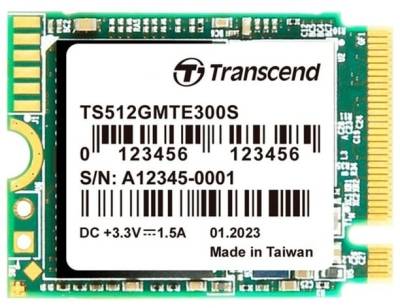Transcend M.2 NVMe Gen 3×4 2230 SSD – 1TB
R2,250
Only 1 left in stock
Purchase & earn 225 points! This item is also available in selected stores, give us a call or drop us a mail for more detailsTranscend MTE300s 1TB M.2 NVMe Gen3 x4 2230 Solid State Drive, DRAM less, 3D NAND Flash Type, Up to 2000 MB/s read speed, Up to 1100 MB/s write speed
Overview:
PCIe SSD 300S
Transcend’s PCIe M.2 SSD MTE300S has a compact form factor and high-quality 3D NAND flash, making it easy to upgrade Ultrabooks, lightweight notebooks, tablets, and handheld gaming PCs. It is designed with multiple firmware optimization technologies, including SLC caching and LDPC ECC mechanism, which improve storage reliability and extend the drive lifespan. The MTE300S is a great choice for boosting the performance of modern work platforms.
Features:
Optimized for Small, Thin Devices
At just 30mm in length, the MTE300S SSD is ideal for Ultrabooks, lightweight notebooks, tablets, and handheld gaming PCs. Thinner and lighter than normal hard drives, the MTE300S SSD gives your computer a much-needed boost while saving space!
High Productivity Anytime, Anywhere
Dedicated to maximizing system performance, the MTE300S SSD features 4K random file read and write speeds of up to 220,000 IOPS. It delivers faster loading and response times when using applications that require high graphics or heavy computing.
Be Bold, Save More.
Built with high-quality 3D NAND flash, the MTE300S SSD unleashes up to 512GB of capacity for your computer, adding more storage space and enhancing computing efficiency.
Always Reliable, Always Evolving.
Despite its extra-small dimensions, the MTE300S SSD contains advanced features that ensure secure data storage and a longer lifespan.
SSD Scope Software
Transcend SSD Scopes user-friendly software has tools that make it easy to ensure your Transcend SSD always remains in tip-top shape for whenever you need it.
Specifications:
| Product Code | TS1TMTE300S |
| Appearance | |
| Dimensions | Single-sided 30.0 mm x 22.0 mm x 2.23 mm (1.18″ x 0.87″ x 0.09″) |
| Weight | 4 g (0.14 oz) |
| Type | M.2 2230 |
| Interface | |
| Bus Interface | NVMe PCIe Gen3 x4 |
| Storage | |
| Flash Type | 3D NAND flash |
| Capacity | 256 GB / 512 GB / 1TB |
| Operating Environment | |
| Operating Temperature | 0°C (32°F) ~ 70°C (158°F) |
| Operating Voltage | 3.3V±5% |
| Performance | |
| Sequential Read/Write (CrystalDiskMark) | 512 GB up to 2,000 / 1,100 MB/s |
| 256 GB up to 2,000 / 950 MB/s | |
| 4K Random Read/Write (IOmeter) | 512 GB up to 90,000 / 190,000 IOPS |
| 256 GB up to 90,000 / 220,000 IOPS | |
| Terabytes Written (TBW) | 512 GB 200 TBW |
| 256 GB 100 TBW | |
| Mean Time Between Failures (MTBF) | 2,000,000 hour(s) |
| Drive Writes Per Day (DWPD) | 0.21 (5 yrs) |
| Note | Speed may vary due to host hardware, software, usage, and storage capacity. |
| The workload used to rate DWPD may be different from your actual workload, which may vary due to host hardware, software, usage, and storage capacity. | |
| Terabytes Written (TBW) expresses the endurance under the highest capacity. | |
| Some motherboards only provide PCIe x2 connections for the M.2 slot, creating a bottleneck on even the fastest drives. | |
| Certificate | CE / FCC / BSMI / KC / RCM / UKCA |
| System Requirement | |
| Operating System | Microsoft Windows 7 or later |
| Linux Kernel 2.6.31 or later | |
| Note | Systems for use with the PCIe M.2 SSD must have an M.2 connector with only an M key. B-key connectors are not compatible. Improper insertion may lead to damage. Please click here for more information. |
| Technology | |
| S.M.A.R.T. | Yes |
| Advanced Garbage Collection | Yes |
| RAID Engine | – |
| LDPC Coding | Yes |
| DRAM Cache | – |























